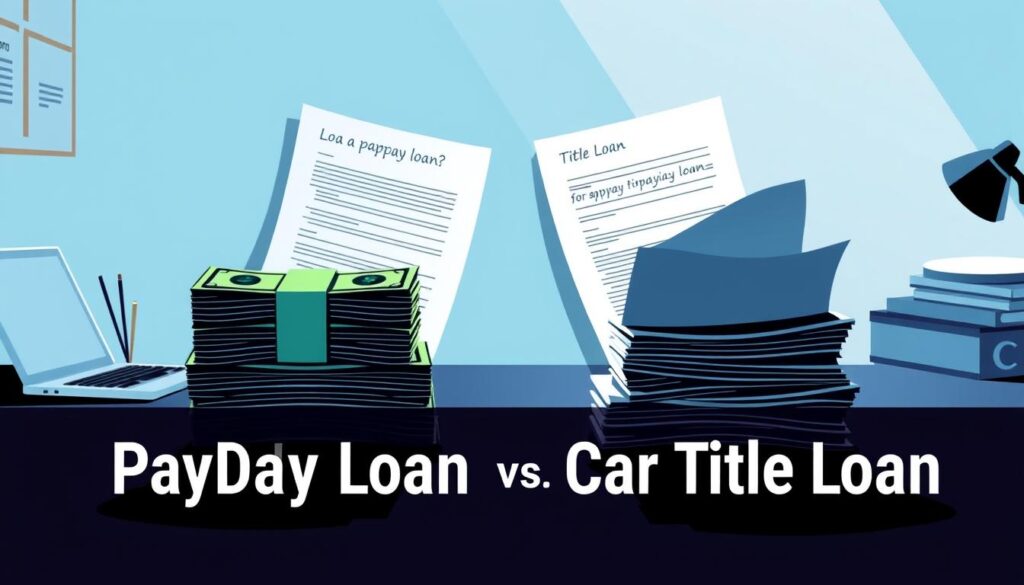Car Title Loans: Quick Cash Solutions Available
When unexpected expenses hit, finding fast funding can feel overwhelming. Secured lending options using your vehicle as collateral offer a way to address urgent needs. These financial products provide immediate access to funds, often within hours of approval, without lengthy credit checks.
Borrow amounts typically range from 25% to 50% of your auto’s current value. For example, a $4,000 vehicle could secure $1,000–$2,000 in emergency funds. This streamlined process helps cover urgent bills like medical costs or home repairs when traditional banks move too slowly.
However, convenience comes with trade-offs. Monthly fees can reach 25%, translating to triple-digit annual rates. While helpful in crises, these agreements require careful evaluation of repayment plans. Defaulting risks losing your transportation, so understanding terms is crucial.
Key Takeaways
- Secured lending uses vehicles as collateral for immediate funding
- Loan amounts reflect 25%-50% of auto market value
- Approval processes often skip deep credit history reviews
- High fees (up to 25% monthly) create significant repayment costs
- Timely repayment protects ownership of collateralized vehicles
Overview of Car Title Loans and Their Role in Quick Cash
Financial emergencies can leave you scrambling for solutions that traditional banks can’t match. Collateral-backed options let you leverage owned assets to secure urgent funds. This approach skips lengthy approval processes while providing same-day access to cash.
Asset Security in Short-Term Agreements
Your transportation becomes the key to quick funding through collateral arrangements. Lenders hold ownership documents as security, allowing them to recover costs if payments stop. Most providers require full ownership, though partial equity might qualify in some cases.
Three items typically seal the deal:
- Clear proof of asset ownership
- Valid government-issued identification
- Current insurance coverage
Common Scenarios for Immediate Funding
People often choose this route when facing time-sensitive bills that threaten basic needs. Medical emergencies and last-minute rent payments top the list of reasons. These agreements become attractive after exhausting alternatives like credit cards or personal loans.
Quick approval comes with strict repayment timelines – usually 15-30 days. While helpful in crises, the high costs demand careful budgeting. Always confirm you can meet payment deadlines before committing.
Car Title Loans: How They Work in Practice
Navigating urgent financial needs requires understanding available options. Secured funding arrangements follow specific steps to protect both parties while delivering fast results. Let’s explore the practical aspects of these agreements.
Starting Your Funding Request
Begin by gathering essential paperwork. Lenders typically need proof of ownership for your auto, a valid ID, and active insurance details. Some providers might ask for recent pay stubs or utility bills to confirm stability.
Asset Evaluation and Security Measures
Providers assess your auto’s condition and market value during an in-person review. This inspection determines your borrowing limit based on current worth. You’ll temporarily transfer ownership documents to the lender as collateral until repayment concludes.
Many institutions take extra precautions like keeping spare keys or installing tracking systems. These measures help recover assets if payments stop unexpectedly. Despite these safeguards, you maintain daily use of your transportation while meeting payment deadlines.
The entire approval process often wraps up within hours, putting funds in your hand quickly. This speed makes collateral-based solutions popular during time-sensitive crises, though careful review of terms remains vital before committing.
Understanding the Costs and Risks Associated with Car Title Loans
Quick cash solutions come with financial realities that demand careful consideration. While these agreements provide immediate relief, their fee structures often surprise borrowers who focus solely on upfront approval speed.
High Interest Rates and Finance Fees
Many secured agreements carry monthly charges equivalent to 25% of the borrowed amount. For a $1,000 arrangement over 30 days, this translates to $250 in fees alone. Annualized, these rates often exceed 300% APR – triple the cost of most credit cards.
Consider this breakdown:
- $1,000 borrowed amount
- $250 monthly finance fee
- Total repayment: $1,250 in 30 days
Impact of Rollovers on Debt Growth
When repayment deadlines approach, some lenders offer extensions called rollovers. While this avoids immediate default, it adds fresh fees to your balance. Extending our example:
- Original $250 fee remains unpaid
- New $250 charge for 30-day extension
- Total fees after 60 days: $500
Important: Multiple extensions can create debt spirals where fees surpass the original loan amount. Always prioritize repayment plans that avoid extensions whenever possible.
“What begins as temporary help can become permanent financial strain if fees accumulate unchecked.”
Smart borrowers compare total repayment costs against their budget before committing. Exploring alternatives might save hundreds in unnecessary charges over time.
Comparing Car Title Loans and Payday Loans
Choosing between emergency funding options requires understanding key differences in structure and risk. Both solutions address urgent cash needs but operate through distinct mechanisms.

Loan Terms and Repayment Periods
Short-term agreements vary significantly in amounts and timelines. Payday options generally cap at $500 with 14-30 day repayment windows. Collateral-based arrangements use asset value to determine borrowing limits, often allowing larger sums.
| Feature | Payday | Collateral-Based |
|---|---|---|
| Average Amount | $100-$500 | 25%-50% of asset value |
| Repayment Window | 2-4 weeks | 15-30 days |
| Fee Structure | $15-$30 per $100 | 25% monthly fee |
Risks and Potential Consequences
Unsecured agreements risk credit damage through collections, while collateral deals threaten transportation loss. Both types carry triple-digit annual rates that can multiply debt through extensions.
Payday users face repeated overdraft charges if payments fail. Those using asset-backed plans risk losing essential transportation, creating work access challenges. Always calculate total repayment costs before committing to either option.
“High-cost lending often solves one crisis while planting seeds for the next.”
Potential Benefits and Safer Alternatives
Exploring better financial solutions can prevent future stress while addressing current needs. Many institutions offer lower-cost options that keep your assets safe and credit intact.
Credit Union and Community Bank Options
Local financial institutions often provide lifelines during cash crunches. Federal credit unions offer payday alternative loans (PAL) with rates up to 80% lower than high-cost options. These come in two forms:
- PAL I: $200-$1,000 loans repayable over 1-6 months
- PAL II: Up to $2,000 with 1-12 month terms
Community banks frequently work with clients facing temporary setbacks. Many offer small-dollar agreements featuring flexible payment schedules and financial counseling services.
Exploring Personal Loans and Credit Card Cash Advances
Traditional lenders and digital platforms provide multiple paths to secure funds responsibly. Personal agreements often feature:
| Option | Average APR | Repayment Period | Key Benefit |
|---|---|---|---|
| Credit Union PAL | 18-28% | 1-12 months | Lowest rates |
| Bank Personal Loan | 6-36% | 12-60 months | Longer terms |
| Credit Card Advance | 25-30% | Immediate | No collateral |
While credit card cash advances carry fees, they cost less than collateral-based options. Most issuers charge 3-5% upfront plus daily interest – still cheaper than triple-digit annual rates elsewhere.
“Building credit through responsible borrowing beats risking essential assets every time.”
Taking time to compare these alternatives helps maintain financial stability. Each option provides immediate help without endangering your transportation or long-term budget.
Regulatory Environment, Legal Protections, and Military Safeguards
Consumer protection laws create safety nets for borrowers navigating urgent financial decisions. Understanding your local rules and military benefits can prevent costly mistakes while securing funds.
State Regulations and Lending Laws
Lending rules change dramatically across state lines. Some areas cap rates at 36% for small loans, while others permit triple-digit charges. Always verify your state’s licensing requirements for lenders – reputable providers will share this information upfront.
Three key protections exist in regulated markets:
- Clear disclosures: Lenders must explain rates and fees in plain language
- Payment plans: Many states require affordable repayment options
- Cooling-off periods: Some regions let borrowers cancel agreements within 72 hours
Special Considerations for Military Servicemembers
The Military Lending Act shields active personnel from predatory rates. This law limits annual percentage rates to 36% across most credit products, including title-based agreements. Service members also get free financial coaching through base programs.
Essential resources include:
- Personal Financial Managers (PFMs) for budget planning
- The Military OneSource helpline at 1-800-342-9647
- Emergency assistance funds through military relief societies
Before considering any high-cost option, explore these safeguards. A quick call could reveal better solutions that keep your assets and credit secure.









